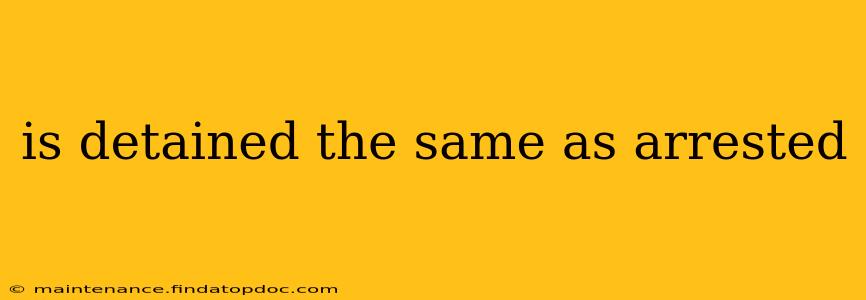Is Detained the Same as Arrested? Understanding the Key Differences
The terms "detained" and "arrested" are often used interchangeably, leading to confusion about the legal implications of each. While both involve restricting someone's freedom of movement, there are crucial distinctions. Understanding these differences is vital, especially if you or someone you know has been subjected to either. This article clarifies the nuances between detention and arrest, addressing common questions and misconceptions.
What is Detention?
Detention is the temporary holding of a person by law enforcement. It's a less formal process than arrest and usually involves a shorter period of time. Detention can occur in various situations, and doesn't always require probable cause, the legal standard needed for arrest. For example:
- During a traffic stop: Police may briefly detain a driver for questioning or to verify their license and registration.
- At an airport or border crossing: Customs and border protection agents may detain individuals for questioning to assess their eligibility to enter a country.
- For investigative purposes: Law enforcement might detain a person for questioning in relation to a crime, but without sufficient evidence for an arrest. This often happens when police are gathering information to determine whether to proceed with an arrest.
- In a psychiatric context: Individuals exhibiting signs of mental distress and posing a danger to themselves or others can be temporarily detained for evaluation.
It's crucial to remember that detention, while restricting freedom, doesn't automatically mean the person is suspected of a crime. The duration of detention is typically limited, and the individual is usually released without charges.
What is Arrest?
An arrest is a more formal process involving the taking of a person into custody on suspicion of a crime. It requires probable cause—meaning police have reasonable grounds to believe a crime has been committed and that the person arrested committed it. An arrest typically involves:
- Formal notification: The individual being arrested is informed they are under arrest.
- Miranda rights (in the US): In the United States, the arrested individual is typically read their Miranda rights, which inform them of their right to remain silent and to have an attorney present.
- Booking process: The arrested individual is taken to a police station where they undergo fingerprinting, photographing, and other procedures.
- Charges filed: Formal charges are usually filed against the arrested individual.
Unlike detention, an arrest leads to a more formal legal process, potentially resulting in prosecution and trial.
What is the difference between being detained and arrested?
The main difference lies in the level of suspicion and the formality of the process. Detention is usually less formal, shorter, and may not involve a suspicion of criminal activity. Arrest, on the other hand, is a formal process indicating a strong suspicion of criminal wrongdoing, backed by probable cause, and triggering a legal process.
How long can someone be detained before they are arrested?
The length of detention is highly variable, depending on the circumstances. While some detentions last only minutes, others can extend for hours. If law enforcement intends to arrest, they must do so within a reasonable timeframe. Unreasonable detention can lead to legal challenges.
What are my rights if I am detained?
While your rights are more explicitly defined during an arrest (like Miranda rights in the US), you still retain fundamental rights during detention. These rights include the right to remain silent, the right to an attorney, and the right to not be subjected to unreasonable searches or seizures.
Can I be arrested after being detained?
Yes, absolutely. Detention can be a precursor to arrest if police gather sufficient evidence during the detention to establish probable cause.
What should I do if I am detained?
Remain calm and polite. You have the right to ask why you are being detained, and you can exercise your right to remain silent. If you feel your rights are being violated, seek legal counsel immediately.
In conclusion, while both detention and arrest involve restricting a person's freedom, the legal implications and procedures differ significantly. Understanding these distinctions is crucial for protecting your rights. If you are ever subjected to either, it is always advisable to seek legal advice.
